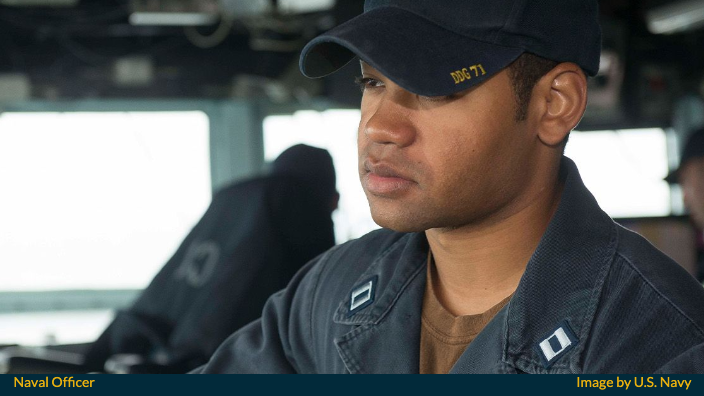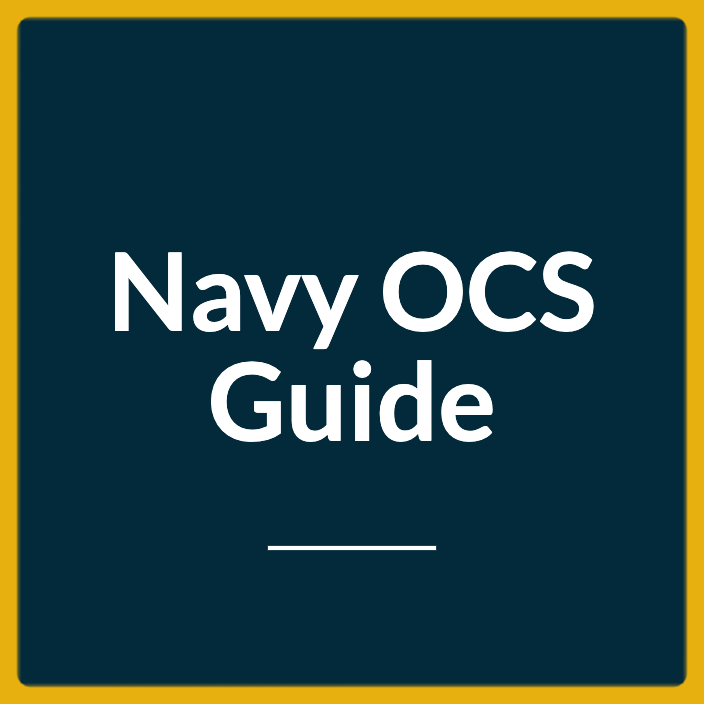Last Updated on September 14, 2023
To join the United States Navy, one can choose between the paths of officer and enlisted.
This guide will look at the differences in education requirements and career advancement between them. We will dive into what it takes to make up this organization’s elite members.
Naval Officer and Enlisted Roles
The U.S. Navy is a renowned and powerful force. It has Officers and Enlisted personnel, with the Officers chosen from college-graduate applicants who have completed specialized leadership training.
Enlisted personnel do not attend college but typically possess military experience or training.
Officers primarily focus on leading while Enlisted personnel concentrate their efforts on mission-related tasks such as maintenance, operational support, and security.
Both Officer and Enlisted personnel are pivotal to the Navy’s success in upholding global peace and security.
The United States Navy is a powerful force protecting global security and peace. Both officers and enlisted personnel contribute to its strength. What are the differences between them?
Key Differences
The United States Navy consists of Officers and Enlisted personnel, with different responsibilities that both play an important role in the success of the organization.
The primary distinction between officers and enrolled personnel is their level of preparation and schooling.
Officers must experience a thorough selection process, which generally requires college-level instruction, and explicit preparation in authority, the board, and different territories.
The roles of Officers and Enlisted personnel differ in their responsibilities; Officers are typically responsible for overseeing operations while Enlisted personnel typically focus on tasks related to mission objectives such as maintenance, operational support, and security.
Officers in the Navy may be referred to as “Commissioned Officers“, which reflects their authority over all the lower-ranked personnel.
Additionally, they typically have higher educational requirements and a greater rank structure, offering more opportunities for career advancement than non-commissioned personnel.
The roles of both officers and enlisted personnel are vital to sustaining global peace and security. Their individual capabilities are essential for the efficaciousness of the U.S. Navy.
Navy Officers

Navy Officers play an important role in the United States Navy, with a focus on excellence, they guide and manage personnel while upholding morals and keeping prepared for operations.
Navy officers generally have college-level education alongside training in leadership, management, and additional relevant topics.
They also possess commissions from the President or Secretary of Defense allowing them to manage all enlistment personnel in the Navy. Therefore, they must perform proficiently and master navy organization principles along with naval warfare practices.
Military officers, in general, need to have communication skills and be able to demonstrate ethical behavior in order to properly guide their subordinates during times of crises, serving as an exemplar for the personnel under their command.
Naval Officers are respected members of the United States Navy, who help contribute to global stability.
Navy Officers provide service and excellence, demonstrating commitment and courage in defending our nation. To be a Navy Officer, having the right education and training is critical; upcoming information will focus on Education Requirements.
Education Requirements
To become a Navy Officer, prospective applicants must have a college degree from an approved institution and complete Navy Officer Candidate School (OCS).
This can be achieved through four years of study at an established college or university, or two years of community college education plus two years in the Navy Reserve. This four-year degree is a crucial requirement for commissioning.
Once accepted into the Navy Officer ranks, officers are obliged to undertake training courses aimed at developing their leadership abilities and understanding of naval tactics. Furthermore, they must maintain physical fitness standards, along with completing drills and exercises on a regular basis.
To be an Officer, one must have the proficiency and expertise in various naval operations from ship navigation to Marine engineering. This way, they can ensure that they are able to meet any situation when on duty.
In order to become a Navy Officer, one must possess dedication and commitment as well as formal education and training. Upon meeting the necessary criteria, individuals become a part of an elite team that safeguards the nation’s interests worldwide.
Training Requirements
Naval Officer Candidates attending Navy OCS need to undertake specialized training, which includes classroom instruction, physical fitness requirements and field exercises. To maintain their qualifications, Officers must also participate in periodic drills and exercises.
Naval officers are required to demonstrate proficiency in ship navigation and marine engineering. They may also need to partake in additional education activities to stay updated on the latest advancements in naval technology and strategies. These training standards guarantee that officers can execute their objectives with accuracy and precision.
Officers must uphold high standards of physical fitness throughout their careers.Required drills and exercises should be performed regularly, and quarterly physical fitness assessments must be successfully completed or the officer may incur disciplinary measures.
Becoming a Navy Officer is difficult and demanding, requiring rigorous training and education to meet the necessary requirements. Once those requirements are fulfilled, one joins an elite team dedicated to protecting national interests worldwide.
Career Paths
Naval officers can pursue specialized roles such as ship navigation and operations, fleet movement coordination, port development and maintenance, and anti-piracy activities. Other naval officers focus on ship maintenance and engineering including hull inspections, mechanical repairs, fuel and supply storage oversight.
Naval officers may specialize in intelligence, air warfare, submarines, strategic weapons, communications, amphibious warfare tactics, or naval aviation. Intelligence officers analyze information from various sources; fighter pilots focus on fighter aircraft; submarine officers work on submarine operations and strategies; strategic weapons specialists are responsible for nuclear strike programs; communications experts manage national defense networks; amphibious warfare officers command assault craft like ships during operations; and naval aviators fly helicopters or fixed-wing aircraft for reconnaissance missions.
Senior Navy officers may take on specialized roles or hold leadership positions, such as the command of a warship, an executive officer of a mission’s squadron, and a budgetary manager responsible for naval base funding.
Additionally, some officers are eligible to ascend to the rank of Admiral where they have the authority to evaluate fleet readiness and appoint senior staff.
Navy Enlisted Personnel
Navy enlisted personnel are essential to mission success, possessing technical knowledge and skills gained in basic training followed by specialized schooling. They carry out a variety of duties from aircraft carrier operations to weapons maintenance or administrative support.
Advanced schooling opportunities such as the Navy Enlisted Professional Development Program are also available for those with ambition. By safeguarding U.S. interests around the world, navy enlisted personnel form a cornerstone of national defense.
Sailors are essential to the Navy, offering technical and administrative support for mission success. Their dedication, commitment and skills make them invaluable to national defense. Are you curious to know what educational requirements are needed to become a sailor? Read on for more information…
Education Requirements
To enlist in the U.S. Navy, there are various education requirements depending on an individual’s rate of specialization and position they are looking for. Generally, a high school diploma or GED is needed, as well as passing ASVAB scores and physical fitness tests.
A college degree is not required for enlisted personnel, although it could be beneficial for certain positions.
Some ratings may need extra training prior to assignment, such as nuclear power school or aviation maintenance technician school. Additionally, throughout their careers, sailors can take advantage of further educational opportunities like college courses via the Navy College Program and distance learning programs.
To join the Navy, individuals must possess acceptable academic qualifications and demonstrate good character traits, such as honesty and integrity. Additionally, they must be free from any criminal records and pass a background investigation.
Training Requirements
Joining the U.S. Navy entails dedication and commitment, but it can bring a range of rewards, including career development and life-skills to be used after leaving service.
All members of the United States Navy who are actively enrolled must undergo a compulsory training and certification program.
This usually begins with Recruit Training Command (RTC or Navy Boot Camp) in Great Lakes, IL, which concentrates on physical development, close-order drill, formal military studies and introduction to the Navy lifestyle over an eight-week period.
Following RTC, sailors are assigned to either A-School or Class “A” School for specialized technical training. The duration of these training programs can range from 6 to 50 weeks based on the sailor’s rate, and is designed to ensure that they have received the necessary instruction when they join their permanent command.
Career Paths
Enlisted service members must meet professional development requirements in addition to initial qualification. To advance in rank, sailors must attend annual Career Development Boards and pass performance reviews.
In certain situations, individuals may need to revalidate qualifications, such as completing special training in Foreign Affairs Protocol procedures when having contact with foreign nationals or obtaining merchant marine licenses to operate vessels.
Subspecialty duties may include additional certifications, such as completion of Dive Medical Technician courses or aviation flight school. This will depend on the assigned role and responsibilities aboard ship.
U.S. Navy sailors can choose from a variety of career paths depending on their interests, background and expertise. Job specialties include operational roles, medical services, information systems, weapons handling, supply chain management, personnel services, legal services, culinary arts and public affairs.
Navy personnel who pursue a career as nuclear engineers have a few avenues for advancement, such as positions in submarine engineering (e.g., Reactor Operator), intelligence analysis (e.g., Cryptologic Technician) or space systems operations (e.g., Space Systems Operations Specialist).
Aside from their expertise, these crew members gain experience in the use of advanced technology and are provided specialized training for their chosen role.
Navy personnel who are healthcare specialists can select specialized roles which necessitate clinical experience such as Mental Health Technician or Medical Laboratory Technician. Alternatively, those wishing to develop their management skills can opt for administrative positions like Hospital Corpsmen Leadership Program Manager or Military Training School Instructor that are exclusive to the Navy.
An enlisted sailor in the Navy will receive on-the-job training, which will help them progress their career while developing leadership experience and carrying out their service duties.
Warrant Officer
Warrant officers are the highest ranking non-commissioned personnel in the Navy and serve as specialists in their respective fields. They have a higher rank than enlisted personnel, but a lower rank than commissioned officers.
Warrant officers typically require a high school diploma or equivalent and at least 12 years of experience in the Navy or Marine Corps. They must also pass several tests including an intelligence test, a physical fitness test, and a technical aptitude test. Additionally, they must demonstrate the highest levels of leadership ability and ethical conduct.
Warrant officers are responsible for providing guidance to enlisted personnel on technical matters related to their specialty, such as engineering or weaponry. They also act as advisors to commissioned officers on military tactics and operations, and serve as mentors for junior enlisted personnel.
More Information
The U.S. Navy provides a variety of career choices for both officers and non-commissioned personnel, featuring advancement possibilities, educational support, and jobs with long-term benefits.
The Navy has tuition assistance programs and unique job opportunities, allowing personnel to climb the ranks or gain ratings based on their performance.
Officers and enlisted sailors have access to educational courses that they can use after they complete their service in order to pursue civilian careers. To sum up, the Navy has a rewarding path open for individuals willing to fully commit.
For more information, contact your local Navy Recruiter. They will provide you with information not available online.


